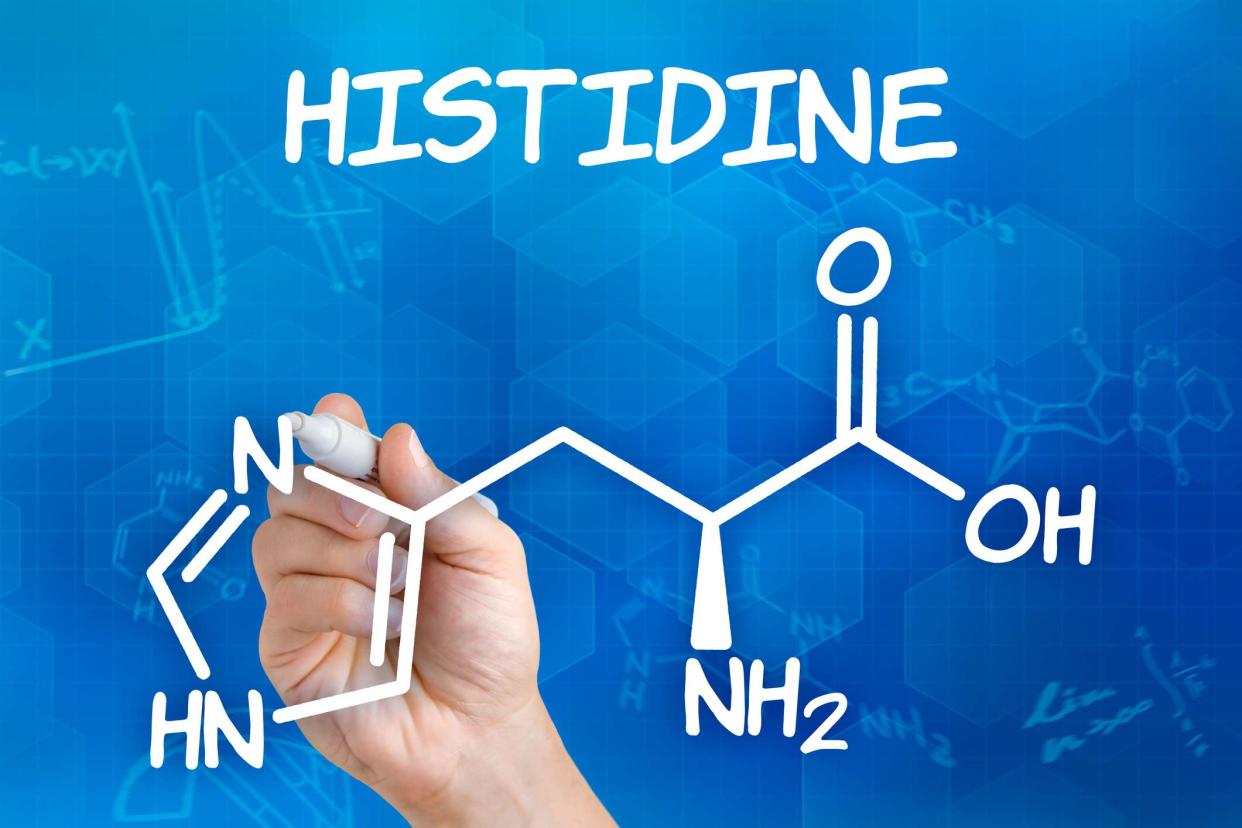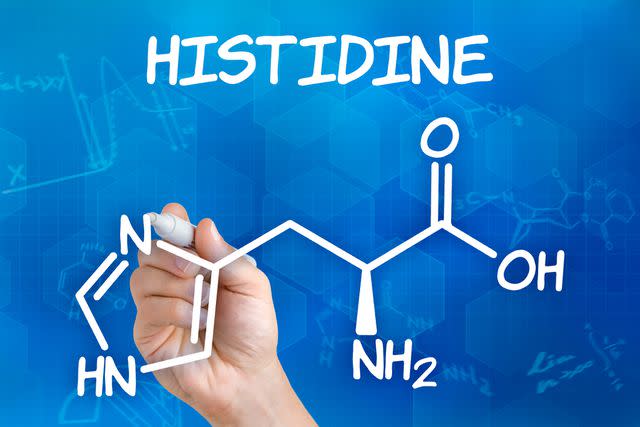What Are the Benefits of L-Histidine?

Zerbor /Getty Images
Medically reviewed by Melissa Nieves, LND, RD

Histidine, also referred to as L-histidine, is an amino acid. It has several functions in the body, including:
Making proteins
Forming carnosine (a peptide important for muscle and brain tissue)
Making histamine (a chemical that mediates allergic reactions)
Bonding (chelating) of metals
Helping with the repair and growth of tissue
Making blood cells
Protection of nerve cells
As an essential amino acid, L-histidine is not produced naturally in the body but must be obtained through food. People also take supplements to increase their levels of L-histidine, believing that the boost can prevent heart disease or improve several conditions, such as rheumatoid arthritis. However, there is very little evidence to support the efficacy of histidine supplementation.
This article discusses more about why people may take L-histidine supplements, the side effects of L-histidine supplements, and the proper amount to take.
Explainer
Dietary supplements are not regulated like drugs in the United States, meaning the Food and Drug Administration (FDA) does not approve them for safety and effectiveness before products are marketed. When possible, choose a supplement tested by a trusted third party, such as USP, ConsumerLabs, or NSF.
However, even if supplements are third-party tested, that doesn’t mean they are necessarily safe for all or effective in general. Therefore, it is important to talk to your healthcare provider about any supplements you plan to take and check in about potential interactions with other supplements or medications.
Supplement Facts
Active ingredient(s): Histidine
Alternate name(s): L-histidine
Suggested dose: Recommended Dietary Allowance (RDA) is 8 to 12 milligrams/kilogram of body weight, which most get through diet; insufficient data for proper dosage as a supplement
Safety considerations: Generally safe in appropriate amounts; see precautions below
Purported Uses of L-Histidine
Supplement use should be individualized and vetted by a healthcare professional, such as a registered dietitian, pharmacist, or healthcare provider. No supplement is intended to treat, cure, or prevent disease.
L-histidine supplements have been researched for various health conditions.
Obesity and Metabolic Syndrome
Most research showing some promising results of L-histidine has been for those with obesity and metabolic syndrome, which is a cluster of conditions that can lead to heart disease, diabetes, and stroke.
A study looked at L-histidine supplementation in 100 women with obesity and metabolic syndrome and assessed insulin resistance, inflammation, oxidative stress, and metabolic disorders. After 12 weeks, those who took L-histidine supplements demonstrated:
Lowered insulin resistance (cells do not respond as they should to insulin)
Lowered fat mass
Suppressed inflammation and oxidative stress
A separate systematic review of 30 different studies found that people with obesity who took histidine-containing dipeptides vs. a placebo had lower waist circumferences and decreased fasting glucose and hemoglobin A1c levels. Hemoglobin A1C measures glucose control over the previous three months.
Takeaway
There may be a role for L-histidine supplementation in people with obesity and metabolic syndrome, but further research is needed. If you are considering supplementation to help with these conditions, it's best to speak to a healthcare provider beforehand to learn about whether it's appropriate for your specific circumstances.
Rheumatoid Arthritis
There is not enough high-quality research and evidence to suggest that L-histidine supplementation improves outcomes in people with rheumatoid arthritis (RA). An older study found no benefit overall from L-histidine supplementation. It did suggest some benefit in individuals with "more active and prolonged disease," but the authors did not advocate for histidine as a treatment for people with RA.
Since then, there has been no further research on L-histidine in this population, and it has not become a standard therapy for this condition.
Heart Disease Prevention
There is not enough evidence that L-histidine supplementation alone will prevent heart disease. L-histidine is one amino acid that makes up the dipeptide carnosine. Carnosine supplementation has been studied in heart disease prevention.
One systematic review found that carnosine lowered hemoglobin A1C levels but did not affect lipid profiles. But just because carnosine lowered hemoglobin A1C levels does not mean that L-histidine would lead to the same result.
L-Histidine Deficiency
An L-histidine deficiency is possible but rare. An L-histidine-deficient diet doesn't result in a negative nitrogen balance for at least a month (longer than it takes for other essential amino acids). A negative nitrogen balance represents net protein breakdown in the body.
L-histidine-deficient individuals have low plasma levels of histidine and may experience atopic dermatitis. They may also have low hemoglobin levels and anemia.
If you have a low protein intake in your diet for a month or more, discuss your diet and supplement concerns with your healthcare provider. Amino acid profiles in the blood can be measured, but this is rarely done. Any suspected single amino acid deficiencies can be corrected with adequate protein intake.
What Are the Side Effects of L-Histidine?
L-histidine is well tolerated and safe when taken at low supplement doses (less than 4.5 grams or 4,500 milligrams per day) in healthy people for a short period (four weeks), according to the 2005 U.S. Dietary Reference Intake Report.
If consumed in excess, more side effects may occur. Some have reported lower levels of folic acid, anorexia or reduced appetite, and a greater loss of zinc.
Taken in proper doses, L-histidine is considered safe for most people. However, you should be cautious about L-histidine supplementation and consult your healthcare provider if the following apply to you:
You are pregnant or breastfeeding: There is not enough data to prove the safety of L-histidine supplementation.
You have folic acid deficiency: L-histidine supplements can cause a chemical called formiminoglutamic acid (FIGLU) to build up in the body in those with folic acid deficiency.
You have liver disease or liver failure: L-histidine supplementation may lead to liver enlargement, high ammonia levels in the blood, and low levels of branched-chain amino acids.
Dosage: How Much L-Histidine Should I Take?
The Food and Agricultural Organization (FAO) of the UN suggests that histidine requirements for dietary intake are 8 to 12 milligrams (mg) per kilogram (kg) of body weight. The recommended dietary allowance (RDA) for histidine is also 8 to 12 milligrams per kilogram of body weight for adults.
The average adult consumes much more than this requirement through diet alone (30 to 35 milligrams per kilogram).
For supplementation, there is not enough information to recommend a specific dose. In one study, 4 grams of histidine daily for 12 weeks appeared to be safe and without side effects.
Takeaway
Most people consume more histidine than required through diet alone.
What Happens if I Take Too Much L-Histidine?
There are no reports of L-histidine toxicity. Also, there is no tolerable upper limit (TUL) established. Yet some healthcare institutions warn against single amino acid supplementation for the following reasons:
It may lead to a negative nitrogen balance.
Increased intake of single amino acid supplements may cause an amino acid imbalance.
Single amino acid supplements are not recommended for those with an adequate protein intake in their diet.
People with liver failure could experience complications with histidine supplementation, including liver enlargement and further progression of liver disease.
Taking 8 grams of L-histidine daily or more has resulted in anorexia and weight loss. Taking higher amounts of histidine (24 to 65 grams daily) may cause:
Gastrointestinal symptoms
Headaches
Drowsiness
Muscle weakness
Changes to taste and smell
There are no known medication interactions with histidine.
How to Store L-Histidine
It is best to follow manufacturer directions for proper storage of supplements. As always, store medications and supplements out of the reach of children and pets to prevent accidental consumption.
Sources of Histidine and What to Look For
Amino acid supplements are available as single amino acids, combination amino acids (e.g., branched-chain amino acids), or protein supplements.
Since amino acids combine to form proteins, any protein supplement or powder will also provide L-histidine. Be sure to read supplement fact labels to know how much L-histidine you are taking from all sources.
L-histidine is found mostly in high-protein foods, including:
Eggs
Beef
Chicken
Pork
Fish
Plant-based sources of L-histidine include:
Soy
Beans
Wheat
Quinoa
Corn
Rice
Single amino acid supplements are available, but histidine can also be found in protein supplements and powders.
When looking for supplements, look for ones that have been third-party tested. This ensures the quality of the supplement, meaning that it contains what the label claims and is free of contaminants. Supplements with seals from USP, ConsumerLabs, and NSF have been third-party tested.
Summary
L-histidine is an essential amino acid. Assuming adequate protein intake, deficiency is rare, and single amino acid supplementation is usually not needed. You will get enough L-histidine if you consume the right amount of protein.
L-histidine supplementation has been marketed for several conditions, but not enough research supports its use. Preliminary research suggests histidine may be helpful for people with metabolic syndrome and obesity, but more research is needed. Therefore, using L-histidine supplements to self-treat any health condition is not recommended. Always consult your healthcare provider before starting a new supplement.

